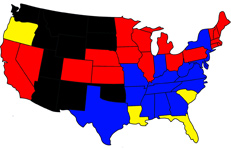Election 1876: A Centennial Clusterfuck
The election of 1876 fell on an important historic year, the Centennial. It fell on the heels of a two-term president, Grant, who entered office wildly popular but left in scandal. Disputed results in Florida led to a decision involving the Supreme Court handing the White House to a guy who lost the popular vote. Sound familiar? If Election 2000 pissed you off, it might piss you off even more to find out it's not the first time it happened.
The Contenders

The candidates themselves are the least interesting parts of the story. Both Governor Rutherford Hayes (Republican-OH) and Governor Samuel Tilden (Democrat-NY) were long standing party faithfuls who stood staunchly against the type of corruption that overtook the Grant presidency. As was the case back then, the candidates did very little themselves. It was the parties who really ran the show.
The Democratic Party – Still the power base in the South, Democrats controlled the House of Representatives. They hadn’t held the White House (Johnson really didn’t count, as he was just a drunken schmuck) since Buchanan, and as such they could not stop passage of the Fifteenth Amendment, giving blacks the right to vote. Knowing this large new block of voters would never vote for the pro-slavery party, Democrats, allegedly supported efforts to openly threaten any black person intending to vote.
The Republican Party – The Party of Lincoln, Republicans controlled the White House, the Senate, and by mandate many Southern governorships. In response to charges of voter intimidation, Republicans allegedly infiltrated local voting boards all over the country in an attempt to block any results they felt were “tainted,” resulting in what would be if true the largest conspiracy of voter fraud in our nation’s history.
The Fight
 Charges of intimidation and fraud went up all over the place causing the state electors in Florida, Louisiana, Oregon, and South Carolina to send to the Senate, for final tally, two or more contradicting results. In all four cases state legislatures favored Hayes. Without these four states, Tilden fell just one vote shy of the majority needed to win. With results in limbo, and Tilden so close to winning, Congress came up with a plan. Clearly everything would be fine.
Charges of intimidation and fraud went up all over the place causing the state electors in Florida, Louisiana, Oregon, and South Carolina to send to the Senate, for final tally, two or more contradicting results. In all four cases state legislatures favored Hayes. Without these four states, Tilden fell just one vote shy of the majority needed to win. With results in limbo, and Tilden so close to winning, Congress came up with a plan. Clearly everything would be fine.
Knowing that simply leaving it up to the House, as the Constitution mandated, would not be enough to quell voters still hard-pressed to trust the government after the Civil War, Congress formed a 15 person electoral committee. Chosen from the House, Senate, and Supreme Court, 15 people (7 Democrats, 7 Republicans, 1 politically neutral) would decide which votes to count. So basically, the entire planned hinged on Associate Justice David Davis, who was the only man in a generation who could truly be considered without political bias. But Davis was elected to the Senate without his knowledge so he had to resign from the commission. There goes that idea.
The plan based entirely on Davis's neutrality now fell to his replacement justice, Joseph Bradley. Not exactly a party loyalist or really all that neutral, Bradley did the best he could. In a nutshell, deciding for Tilden meant supporting the suppression of black votes and federal government intervention in state decisions, like election results. Deciding for Hayes meant supporting massive voter fraud but also the rights for states to decide elections without interference.
At the last possible minute, and allegedly after Republican leaders offered him a lot of money, Bradley went for Hayes. This is how we, as a stable democracy, chose our 19th President. Awesome.
The Title
The American people immediately cried foul. Southerners refused to follow the president they did not believe they elected, even going as far as threatening another war. To keep everyone happy, Hayes passed the Compromise of 1877, ending military occupation of the South, sounding the death knell for Reconstruction, and opening the doors to state sponsored violence against blacks. No skin off Hayes’s back, he was much happier focusing on rooting out corruption in federal office appointments.
The election and its aftermath took its toll on Tilden. He died in 1886, long enough to see a real Democrat (fuck you, Andrew Johnson) in the White House. In reference to this scandalous election, Tilden’s tombstone reads, “I Still Trust the People.”
Next Up – Election 1896: War of the Words
The Contenders

The candidates themselves are the least interesting parts of the story. Both Governor Rutherford Hayes (Republican-OH) and Governor Samuel Tilden (Democrat-NY) were long standing party faithfuls who stood staunchly against the type of corruption that overtook the Grant presidency. As was the case back then, the candidates did very little themselves. It was the parties who really ran the show.
The Democratic Party – Still the power base in the South, Democrats controlled the House of Representatives. They hadn’t held the White House (Johnson really didn’t count, as he was just a drunken schmuck) since Buchanan, and as such they could not stop passage of the Fifteenth Amendment, giving blacks the right to vote. Knowing this large new block of voters would never vote for the pro-slavery party, Democrats, allegedly supported efforts to openly threaten any black person intending to vote.
The Republican Party – The Party of Lincoln, Republicans controlled the White House, the Senate, and by mandate many Southern governorships. In response to charges of voter intimidation, Republicans allegedly infiltrated local voting boards all over the country in an attempt to block any results they felt were “tainted,” resulting in what would be if true the largest conspiracy of voter fraud in our nation’s history.
The Fight
 Charges of intimidation and fraud went up all over the place causing the state electors in Florida, Louisiana, Oregon, and South Carolina to send to the Senate, for final tally, two or more contradicting results. In all four cases state legislatures favored Hayes. Without these four states, Tilden fell just one vote shy of the majority needed to win. With results in limbo, and Tilden so close to winning, Congress came up with a plan. Clearly everything would be fine.
Charges of intimidation and fraud went up all over the place causing the state electors in Florida, Louisiana, Oregon, and South Carolina to send to the Senate, for final tally, two or more contradicting results. In all four cases state legislatures favored Hayes. Without these four states, Tilden fell just one vote shy of the majority needed to win. With results in limbo, and Tilden so close to winning, Congress came up with a plan. Clearly everything would be fine.Knowing that simply leaving it up to the House, as the Constitution mandated, would not be enough to quell voters still hard-pressed to trust the government after the Civil War, Congress formed a 15 person electoral committee. Chosen from the House, Senate, and Supreme Court, 15 people (7 Democrats, 7 Republicans, 1 politically neutral) would decide which votes to count. So basically, the entire planned hinged on Associate Justice David Davis, who was the only man in a generation who could truly be considered without political bias. But Davis was elected to the Senate without his knowledge so he had to resign from the commission. There goes that idea.
The plan based entirely on Davis's neutrality now fell to his replacement justice, Joseph Bradley. Not exactly a party loyalist or really all that neutral, Bradley did the best he could. In a nutshell, deciding for Tilden meant supporting the suppression of black votes and federal government intervention in state decisions, like election results. Deciding for Hayes meant supporting massive voter fraud but also the rights for states to decide elections without interference.
At the last possible minute, and allegedly after Republican leaders offered him a lot of money, Bradley went for Hayes. This is how we, as a stable democracy, chose our 19th President. Awesome.
The Title
The American people immediately cried foul. Southerners refused to follow the president they did not believe they elected, even going as far as threatening another war. To keep everyone happy, Hayes passed the Compromise of 1877, ending military occupation of the South, sounding the death knell for Reconstruction, and opening the doors to state sponsored violence against blacks. No skin off Hayes’s back, he was much happier focusing on rooting out corruption in federal office appointments.
The election and its aftermath took its toll on Tilden. He died in 1886, long enough to see a real Democrat (fuck you, Andrew Johnson) in the White House. In reference to this scandalous election, Tilden’s tombstone reads, “I Still Trust the People.”
Next Up – Election 1896: War of the Words
Labels: elections, Politics, presidents





 This blog is not to be taken seriously. Seriously. I take this seriously, but you shouldn't. You should do what you want, but you'll probably enjoy this more if you don't take anything I say seriously. I mean, I mean what I say, but it's not serious. Oh also, swearing is hilarious. It shouldn't be, but it is.
This blog is not to be taken seriously. Seriously. I take this seriously, but you shouldn't. You should do what you want, but you'll probably enjoy this more if you don't take anything I say seriously. I mean, I mean what I say, but it's not serious. Oh also, swearing is hilarious. It shouldn't be, but it is.


0 Comments:
Post a Comment
Subscribe to Post Comments [Atom]
<< Home